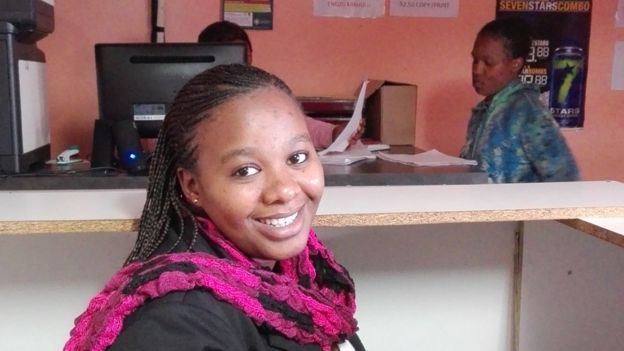Lance Petersen sits in his radio studio and chats into his microphone.
While most DJs of his age let the music do the talking, the 25-year-old very much likes to converse with his listeners.
Lance is the founder and owner of Vibe Radio SA, an internet radio station based in the Cape Town township of Athlone.
Set up in 2011, Vibe is aimed at South Africa's teenagers and young adults.
With listeners across the country, it engages with them on topics ranging from bullying, to HIV/Aids, fashion, and advice on becoming an entrepreneur.
Lance says: "The point of Vibe Radio is to provide a platform that focuses solely on the youth voice, and gives young people the opportunity to say what's on their mind, and be heard."
He adds that the radio station was born from his own frustration at the lack of support given to young people in South Africa, and the failure to make them heard on a national level.
"The scariest realisation I had was that the young didn't have a voice, or were seldom heard," says Lance.
"It was at that realisation that I knew I had to find a way to start my own radio station."
A former TV producer, Lance set up the station using his own savings, and support from a Cape Town-based social enterprise called Reconstructed Living Lab (RLabs).
Vibe now has 16 employees, and makes money from advertising.
With the youth unemployment rate in South Africa standing at 37.5% (for people between the ages of 15 and 34), job opportunities are few and far between for many of Vibe's listeners.
As a result, much of the station's focus is on discussing how young people can best go about launching and running their own businesses.
Lance says the aim is for this always to be done in an interesting and entertaining way, or as he calls it - "edutainment".
So for example, in a recent discussion about becoming a concert promoter, and how the cost of each ticket breaks down, he discussed a tour by teen heartthrob Justin Bieber.
Numerous challenges
Another young entrepreneur from a Cape Town township, Andisiwe Nyavula, says that young people in her community need access to basic business services if they are to create self-sustaining companies. So since 2012 she has taken matters into her own hands.
Ms Nyavula, 25, is the founder of Nzum Nzum, a chain of three business centres cum internet cafes that offer photocopying, printing and faxing, company registration, and web access to those trying to get their start-ups off the ground.

Andisiwe Nyavula offers a range of business services
The prices range from five South African rand (35 cents; 27p) for 30 minutes of internet access, to one rand per page of photocopying, and 80 rand for 10 business cards.
About 3,000 people use the centres per month, which are located in the Cape Town townships of Nyanga, Phillipi and Gugulethu.
But as much as Ms Nyavula tries to make a difference, she admits that there are many challenges facing township entrepreneurs that also need to be addressed, such as the high crime rates, rogue landlords, and unhelpful service providers.
"It took more than three months to install a reliable connection at our new internet cafe," she says. "And if there's a problem it takes more than two weeks to fix it.
"The townships have long been shunned by big businesses."
'Incredible individuals'
The World Bank estimates that more than half of South Africa's 53 million population lives in townships and other informal settlements.
With that many potential customers, South Africa's townships should by rights be looked upon as potential economic hotspots.
But attention tends to focus on the negatives, and little notice is given to the economic success stories hiding within South Africa's sprawling townships.
"There are incredible individuals with amazing ideas and grassroots businesses that they run in the townships," says Craig Dumont, a member of the management team at RLabs.
RLabs, which receives government grants to fund its work, provides would-be township entrepreneurs with training and support.
From its main hub in a Cape Town township, since 2008 it has been an incubator for more than 50 start-up companies, and has seen thousands of entrepreneurs - including Vibe Radio's Lance Petersen - walk through its doors and receive business support.
According to Mr Dumont, not only are township entrepreneurs innovative and determined, their knowledge of local needs gives them an advantage over corporate South Africa.
"Township entrepreneurs have a deep understanding of their environment, the challenges, and their target audience," he says.
'Uplifting people'
Based in the Kayamandi township on the outskirts of the affluent Western Cape town of Stellenbosch, some 50km (30 miles) east of Cape Town, Loyiso Mbete is the type of businessman that Mr Dumont would say deserves more credit.
Mr Mbete, 36, is a beekeeper who owns more than 400 hives and employs three people.
He jokes that demand for his honey and related services - such as fruit pollination - is so high that he struggles to keep up.
"I came from a poor family so there was always a need to make it in life," says Mr Mbete. "I had no choice but to find ways and means to make ends meet."
He adds: "It is important to understand that those businesses active in township are feeding the poor and uplifting people out of poverty. They also help create employment, so they are making a big contribution to the South African economy."
While many businesses in South Africa's townships complain that they don't get enough help from the authorities, the Western Cape Government says that in recent years it has greatly increased the support on offer.
Alan Winde, its Minister for Economic Opportunities, says that over the past two years more than 2,000 small businesses based in townships across the province have been assisted by a scheme called the emerging business support programme. This provides financial management, sales and marketing training.
He adds: "Regions across the province, including townships, are vibrant spaces for innovative small businesses."
Source: bbc.com


